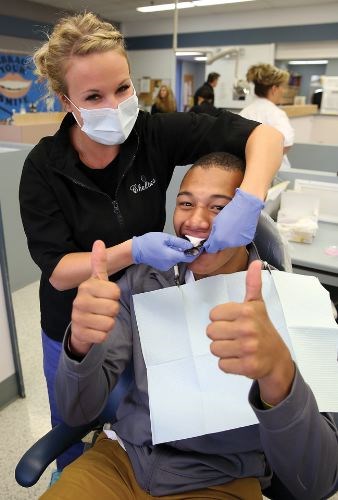On a sunny weekday afternoon, Prince George Cougars players stroll into the waiting room of the dental clinic and sit patiently until their name is called.
One by one they eventually make their way into the brightly-lit clinic at the College of New Caledonia and get comfy in their chairs.
The preseason visit is not for a regular checkup for the Western Hockey League players. Rather, it's to ensure their pearly whites, as well as their heads, are protected.
On a counter behind the chair, second-year dental hygiene student Chelsea Lestage puts three scoops of white powder into a blue bowl and mixes it with a measured amount of water.
The thick, gooey mixture turns pink in its liquid form.
Lestage pours it into a metal mould, spreads it out and asks her patient to open wide. She places it snuggly on the top row of her patient's teeth.
The impression has to go right to the top of the inside upper lip to cover the entire length of the tooth crown. It takes about two minutes for the mixture to make a solid impression on the player's teeth.
Lestage's patient is Kolby Johnson, a six-foot-two, 200-pound 17-year-old left-winger for the Cougars who's entering his third season with the team.
He's one of 26 players at the campus clinic who'll receive custom-fit mouth guards.
Once the impression is made, it's slipped into a small clear plastic bag with the player's name on it, taken down the hall to the lab where it'll harden into a white flexible piece of protection for their mouths. The guards are made out of strong two-layer material of high energy absorbing EVA vinyl.
The brand new guards were delivered to the team last week.
Johnson has been to the clinic before, prior to the start of the 2014-15 season.
"This is my second year doing it," said Johnson after rinsing his mouth with water. "It feels like I'm swallowing a bunch of clay."
He realizes the importance of the visit that day - mouth guards help reduce teeth and concussion injuries. Plus they're mandatory in the WHL.
"I think they're (the guards are) good if I get hit in the face or hit from behind. I don't want to get hurt," said Johnson. "I still use my guard from last year."
Making and providing mouth guards is a partnership the Cougars and CNC's dental department have had since 1996.
Heather Brown, a clinic coordinator and instructor with CNC's Dental Studies, has overseen the project since day one.
"We discussed the potential of doing them after (students') clinical hours," she said. "If we made the impressions, we would give the players $20 for their community fundraisers."
The Cougars ownership covers the cost of the $60 mouth guards.
"It's an important part of staying healthy and protecting the integrity of their teeth," added Brown. "There's documentation that tooth protection can reduce concussion injuries."
Lestage, who earned her dental assisting certificate from CNC in 2011 and will graduate with her dental hygiene diploma in 2016, said it's good work experience for the dental students.
If players are caught on the ice without a guard, they're assessed a 10-minute misconduct. It's a rule the WHL has had in place for some time. The guards also must be coloured, not clear, so they're easily identifiable by the referees.
Cougars right-winger Tyler Mrkonjic has had a custom-fit mouth guard since he joined the team three years ago.
"It's good to have, but it's kind of gross (getting it done)," the six-foot-three 200-pound 19-year-old said outside in the waiting room. "It's nice to be able to come here and the students get to practice making them. I had one for two years and it fit perfectly. It's easier to breathe with them."
Cougars certified athletic therapist Craig Hyslop said it's beneficial for the guys on the team to have a really good-fitting guard that will stay in place properly.
If players take care of them, they can last an entire season.
"Having a good-fitting one you can breathe normally and talk with it," he said, adding it's a little bit of a trend for the guys to chew on their mouth guards in hockey. "And if you do get hit and you're not expecting it, it (the guard) will stay in place."
If a player does get hit, mouth guards can absorb the resulting vibrations, he said.
"A lot of the vibrations that get sent through (the body), it won't necessarily help with the first impact but with a lot of the second impact vibrations. A lot of it is the teeth clanging together. Depending where they are hit, if it's on the side of the head or on the jaw, a lot of that will go through the mouth guard."
During training camp and throughout the season, Hyslop has conversations with the players about concussions and what to watch out for.
"As far as concussions go, I have a good talk with the guys so that they know what kind of symptoms to deal with," he said. "Obviously I'm on the bench and if I see something that appears that there might be some sort of head trauma, I'll go talk to the guy and pull him aside and have a good talk with him. The players do kind of know what to look for themselves if they do have a head trauma in case I miss something and have a pretty good idea what it would look like if they are concussed."
Hyslop said it's becoming more and more common for athletes to wear mouth guards in non-contact sports such as alpine skiing.
As for CNC's dental students, building custom-fit mouth guards is something they'll do not just for the Cougars, but other organizations if they ask.
For information, contact Brown at 250-561-5848 ext. 5615.



